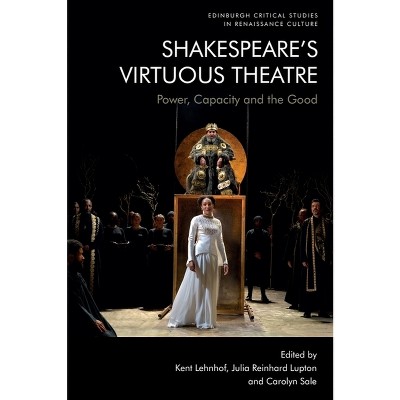About this item
Highlights
- Uncovers the workings of sovereign power in Shakespeare's history plays Presents a sustained, formalist reading of Shakespeare's history playsReads Shakespeare's history plays for their contribution to political thought, and to theories of sovereigntyDelivers a thorough and wide-ranging formal analysis of Shakespearean body parts, both literal and figurativePresents a particular view of Shakespeare's language-use as "baroque", its convolutions contributing to complex articulations of sovereign willCapitalises on current theories of authorship in relation to the history plays in order to assess Shakespeare's particular contribution to how sovereignty is imagined in the late sixteenth centuryThis book provides a sustained, formalist reading of the multiple body parts that litter the dialogue and action of Shakespeare's history plays, including Henry V, Richard III, Richard II, King John and Henry IV.
- About the Author: Huw Griffiths is Senior Lecturer in Early Modern English Literature, University of Sydney, Australia.
- 160 Pages
- Literary Criticism, European
Description
About the Book
This book provides a sustained, formalist reading of the multiple body parts that litter the dialogue and action of Shakespeare's history plays.
Book Synopsis
Uncovers the workings of sovereign power in Shakespeare's history plays
Presents a sustained, formalist reading of Shakespeare's history playsReads Shakespeare's history plays for their contribution to political thought, and to theories of sovereigntyDelivers a thorough and wide-ranging formal analysis of Shakespearean body parts, both literal and figurativePresents a particular view of Shakespeare's language-use as "baroque", its convolutions contributing to complex articulations of sovereign willCapitalises on current theories of authorship in relation to the history plays in order to assess Shakespeare's particular contribution to how sovereignty is imagined in the late sixteenth century
This book provides a sustained, formalist reading of the multiple body parts that litter the dialogue and action of Shakespeare's history plays, including Henry V, Richard III, Richard II, King John and Henry IV. With a starting point in literary critical analyses of these dislocated bodies, the book tracks Shakespeare's relentless pursuit of a specific political question: how does human flesh, blood and bone relate to sovereignty? Griffiths advances our understanding of how human bodies are captured by -- and escape -- the grip of political systems.
From the Back Cover
Uncovers the workings of sovereign power in Shakespeare's history plays This book provides a sustained, formalist reading of the multiple body parts that litter the dialogue and action of Shakespeare's history plays, including Henry V, Richard III, Richard II, King John and the Henry IV plays. With a starting point in literary critical analyses of these dislocated bodies, the book tracks Shakespeare's relentless pursuit of a specific political question: how does human flesh, blood and bone relate to sovereignty? Griffiths advances our understanding of how human bodies are captured by -- and escape -- the grip of political systems. Huw Griffiths is Senior Lecturer in Early Modern English Literature at The University of Sydney.Review Quotes
Supple in its individual readings and conceptually sophisticated in its account of the inescapably contingent nature of political authority, Huw Griffiths' analysis of the poetics of sovereignty will have consequences for Renaissance studies that extend well beyond his point of focus: Shakespeare's history plays.--Christopher Pye, Williams College
About the Author
Huw Griffiths is Senior Lecturer in Early Modern English Literature, University of Sydney, Australia. He is the author of Hamlet: A Reader's Guide to Essential Criticism (London: Palgrave, 2005) and "Solitude Interrupted: John Ford's Soliloquies" Shakespeare and the Soliloquy, Eds. Daniel Derrin and Anthony Cousins (Cambridge: Cambridge UP, in press), in addition to many journal and book articles.
Shipping details
Return details
Trending Fiction












